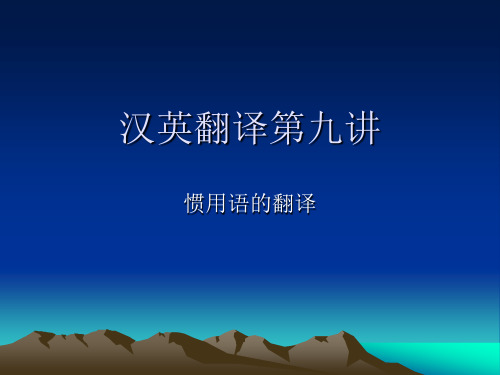中国习惯用语英语新译(上)
- 格式:doc
- 大小:22.00 KB
- 文档页数:2




试论汉语惯用语的翻译方法探讨汉语惯用语【论文关键词】汉语惯用语翻译翻译方法【论文摘要】汉语惯用语丰富了汉语语言,如何翻译汉语惯用语是本文的中心,本文探讨了常用的翻译方法在惯用语翻译中的应用,为翻译工作者提供一些思路。
在汉语中,存在着大量的习惯用语,而这些习惯用语在我们的日常生活中时时刻刻都会出现,正确使用惯用语能使我们的语言锦上添花,但是在和外国人交际时,我们不可避免的也要使用到惯用语,对于日常生活中耳熟能详的惯用语我们应该怎么翻译呢?本文将对惯用语的特征进行分析,然后探讨其翻译方法。
一、惯用语是汉语熟语的一种汉语惯用语有以下几个特点:(1)构成相对稳定,结构相对固定。
即,词组的主要成分不是自由组合搭配的。
如"不管黑猫白猫,捉住老鼠的都是好猫",我们就不能把"黑猫"替换成"灰猫""蓝猫"等。
(2)整体意义不是每个词各自单独意义的叠加。
(3)具有明显的口语色彩。
(4)具有一定的修辞作用。
汉语惯用语同英语idiom(成语、习语)相比较后,idiom有以下特点:(1)它是一组词,而不是一个单词。
(2)结构相对稳定。
(3)意义不是构成成员各自意义相加而成的,而是整体意义。
(4)翻译时不能逐词硬译。
汉语惯用语的基本特征同英语idiom所具备的四个基本特征相似,因此可将汉语惯用语英译成"idiomatic Chinese"。
汉语惯用语是一种是用频率高、表达力强、形象生动,在各种形式的口头、文字材料中经常出现的语言现象。
因此对汉语惯用语的英译研究是很有必要的。
汉语惯用语的英译研究基本反映了整合(Integrational Approach)特征。
符合现代语言研究向整合方向发展的趋势。
虽然说占 20世纪语言研究主流的是孤立法(Segregational Approach),这种方法也曾为现代语言教学提供了许多理论,但其将语言作为封闭的符号系统的研究方法,随着语言研究的深入,已经越来越不能适应语言研究的需要。
而整合语言学(Integrational Linguistics)形成于20世纪80年代,以哈里斯(Roy Harris)、努伍(Nigel Love)、泰勒(Talbot Taylor)为代表,认为语言研究不能忽视非语言成分,并强调语用、功能及文化对交际的影响。

中国习惯用语英语新译·一桶水摇不响,半桶水响叮当 有人照字面译成:The full pot of water makes no sound; the half-empty pot of water is noisy. 老外听后,也许会感到困惑。
他们有自己的说法: A little knowledge (or learning) can be (or is) dangerous.(一知半解很危险) 或者说: Still water runs deep.(静水深不可测) 也可以说: He who knows the most says the least.(懂得越多的人, 反而说得越少。
) 至于“大智若愚”,通常可以这么说: A truly wise person does not show off his (her) ability. (真正聪明的人,是不会显要自己的能力)· 水落石出有人照字直译为: As the water level sinks,the stones are exposed. 这样说,恐怕老外还是听不懂。
他们的说法是:All secrets may eventually come to light. (所有祕密最后 总会曝光。
) 也可以说: Eventually, every secret will be disclosed.· 这山望到那山高 有人译成:The apples on the other side of the wall are the sweetest.(意思是:墙那边的苹果最甜) 当然,如要译成: If you stand on a mountain, you feel the distant mountain seems higher than yours. 老外也勉强能接受。
而他们的最习惯说法是: The grass always looks greener on the other side.(另 一边的草,看来总是绿些。

用英文表达中文惯用语1. 炒鱿鱼:比喻某人被解雇、辞退Literal meaning(字面意义):To fry cuttlefishFigurative meaning(比喻意义): Be sacked / be firedE.g. He was fired for always being late.2. 出气筒:比喻那些无故受气的人Literal meaning(字面意义):Breathing-out pumpFigurative meaning(比喻意义): Punching bagE.g. He always uses Ken as a punching bag.Don't use anyone as a punching bag.3. 穿小鞋:比喻暗中打击报复或利用权利故意刁难,使别人痛苦Literal meaning(字面意义):Give someone tight shoes to wearFigurative meaning(比喻意义): Make things hard for someoneE.g. Don’t make things hard for Jeremy.4. 出风头:指故意吸引别人的注意,骄傲地显示自己比别人强Literal meaning(字面意义):Stand out at the wind’s headFigurative meaning(比喻意义): Seek the limelight / show offE.g. She always tries her best to seek the limelight on different occasions.They enjoy showing off on certain occasions.5. 吹牛皮:指夸口、说大话Literal meaning(字面意义):Blow up a bull’s skinFigurative meaning(比喻意义): To boast / to bragE.g. Someone likes to brag.You are always boasting.6. 掉链子:比喻在关键时刻出现了问题而使事情产生了不好的结果Literal meaning(字面意义):(Bike) chain falls offFigurative meaning(比喻意义): Drop the ballE.g. He dropped the ball at the critical moment and led to a bad consequence.7. 兜圈子:指说话拐弯抹角、不干脆、不直接Literal meaning(字面意义):Circle aroundFigurative meaning(比喻意义): Beat about the bush/ beat around the bush E.g. Don’t beat around the bush.I see no reason to beat about the bush.。
托福听力常见英语习惯用语汇托福听力常见英语习惯用语汇总一览, 这22个地道说法你知道吗?今日我给大家带来了托福听力常见英语习惯用语汇总一览,盼望能够关心到大家,下面我就和大家共享,来观赏一下吧。
托福听力常见英语习惯用语汇总一览这22个地道说法你知道吗?1.all over the place中文翻译:乱七八糟的;处处都是英语释义:completely disorganized or confused真题例句:Yeah,well, there used to be beavers all over the place, something like 200 million beavers, just in the continental United States.例句翻译:这里曾经处处都是海狸,也许有200万只生活在美洲大陆上。
2.all the rage中文翻译:风靡一时英语释义:英语释义:popular or fashionable at the moment真题例句:Before long, Hawaiian steel guitar music was all the rage in the mainland US.例句翻译:不久,夏威夷吉他就在US本土风靡起来。
3.at odd中文翻译:争吵;不全都英语释义:cannot agree or argue with someone真题例句:They try to fit in with the rest of the world even though it’s at odds with their beliefs and their identities.例句翻译:他们正努力融入世界,尽管他们和世界其他地方有着不同的身份和信仰。
4.be that as it may中文翻译:即使如此,尽管那样; 话虽如此英语释义:even so, even now真题例句:But be that as it may, whatever the exact date, whether its 15,000, 20,000or 30,000 years ago, the Chauvet paintings are from the dawn of art.例句翻译:尽管如此,无论精确的日期是哪天,哪怕是在15000、20000还是30000年前,肖维岩洞的壁画都被认为是艺术的开端。
用英文表达中文惯用语 1. 东道主:泛指接待或请客的主人Literal meaning(字面意义):Owner of the road in the eastFigurative meaning(比喻意义): HostE.g. To our host, President Ran. 这杯敬我们的东道主,冉主席。
2. 恶作剧:指那种故意戏弄别人而使别人害怕、尴尬或痛苦的行为Literal meaning(字面意义):A mischievous trick / an evil trick Figurative meaning(比喻意义): A prank / a practical jokeE.g. A prank is a childish trick.People play pranks on one another on April Fool’s Day.3. 耳边风:用来比喻听了不放在心上的话Literal meaning(字面意义):A wind passing by one’s earsFigurative meaning(比喻意义): Words or advice that are not taken seriously by the listener / go in one year and out the otherE.g. Anything we tell them goes in one year and out the other!4. 鬼门关:用来比喻那些可怕、危险的地方Literal meaning(字面意义):The gate of ghostsFigurative meaning(比喻意义): A danger spot / the jaws of deathE.g. He is rescued from the jaws of death.5. 旱鸭子:指那些怕下水或不会游泳的人Literal meaning(字面意义):Dry duckFigurative meaning(比喻意义): Landlubber / someone who can’t swim or is afraid of waterE.g. I'm a landlubber.You are always boasting.6. 和稀泥:指分不清楚事情的对错,只是没有原则地用折中的办法处理事情Literal meaning(字面意义):Mix liquid mudFigurative meaning(比喻意义): Try to mediate differences at the sacrifice of principleE.g. He often tries to mediate differences at the sacrifice of principle.7. 红眼病:比喻羡慕、嫉妒别人Literal meaning(字面意义):Red eye disease / pinkeyeFigurative meaning(比喻意义): Green-eyed / envious or jealous of another’s advantagesE.g. Jealousy is a green-eyed monster.。
词语的翻译词语的翻译语义来自上下文他说: “她这个人真有意思。
”她说:“他这人挺有意思。
”于是有人传言:她和他有了意思,要他们赶快意思意思。
他发火了,说:“你们这样瞎说是什么意思。
”传言者有点不好意思,便解释说:“仅仅是开开玩笑而已,绝没有别的意思。
”事后,有人说:“真有意思。
”也有人说:“真没意思。
”又如:民间性经济文化关系、民间组织non-governmental民间传说popular民间工艺folk 在中国人心中in the minds of 心甘情愿be most willing to心明眼亮be sharp-eyed and clear-minded心连心heart linked to heart心里话one’s innermost thoughts and feelings 祖国统一reunification卫生局public health bureau卫生设备sanitary equipment卫生标准hygienic standard 卫生纸toilet paper卫生球camphor ball 开门open the door开车drive a car开会hold a meeting 开灯turn on a light开业start a business 开支票write a check开玩笑play a joke 开夜车work late into the night 词语翻译的基本技巧:移植法、增减法、词汇转类法、反译法、合译法和分译法等。
1.移植法:在译文中直接借用原文词语。
(名词的翻译)1.1直接移植:将原文中的词语原封不动地挪用过来,多应用于科技翻译和新闻媒体中。
例KTV; DISCO; IQ;EQ1.2音译用一种语言文字写出或读出另一种语言的词和词组的发音。
音译适用以下范围:几乎所有的人名。
例如:Lincoln 林肯孙中山Sun Yat-senShakespeare 莎士比亚Bernard Shaw 肖伯纳毛泽东Mao Zetung蒋介石Chiang Kai-shek大多数地名。
中国习惯用语英语新译(上)
·一桶水摇不响,半桶水响叮当
有人照字面译成:The full pot of water makes no sound; the half-empty pot of water is noisy.老外听后,也许会感到困惑。
他们有自己的说法:
A little learning is a dangerous thing.(一知半解很危险)
Still water runs deep.(静水深不可测)
He who knows the most says the least.(懂得越多的人,反而说得越少。
)
A truly wise person does not show off his (her) ability.(真正聪明的人,是不会显要自己的能力)
·水落石出
有人照字直译为:As the water level sinks,the stones are exposed.这样说,恐怕老外还是听不懂。
他们的说法是:
All secrets may eventually come to light. (所有祕密最后总会曝光。
)
Eventually, every secret will be disclosed.
·这山望到那山高
有人译成:The apples on the other side of the wall are the sweetest.(意思是:墙那边的苹果最甜)
If you stand on a mountain, you feel the distant mountain seems higher than yours. 老外也勉强能接受。
The grass always looks greener on the other side.(另一边的草,看来总是绿些。
)
·烈火炼真金,患难见真情
有人译成:Fire is the test of gold;adversity is the test of friendship. 这句译文,虽然很好,老外也能了解,但是他们还有另外的说法:
Liquor brings out a person's true color.(烈酒能显示一个人真正的特色) Wine reveals a person's true heart.
虽然老外不用“烈火炼真金”的比喻,但有“路遥知马力”的说法:
By a long road, we know a horse's strength;at times of difficulty, we discover a friend's true character.
·雷声大,雨点小
有人译为:The thunder roars loudly, but little rain falls. 或者说:All we hear is thunder, but no rain falls.
虽然这样直译比较容易理解,但是老外的说法是这样的:
Actions speak louder than words. (行动胜于言谈)
All we hear is words, but there is no action. (只动嘴不动手)
Actions and words should go hand in hand. (言行必须一致)
An empty barrel makes biggest sound.(空洞的话说得太多了。
)
·人不可貌相,海水不可斗量
有人译为:A man can not be known by his look, nor can the ocean be measured by a dipper.这样的译法只是直译,如果能够稍加修改,老外就能了解:
A man can not be judged by his appearance, nor can the water in the sea be measured by a bucket.
We can not judge a person by appearance only.
You can not judge a book by its cover.(意思是:一本书的好坏取决于它的内容,而不是它的封面装帧的漂亮与否。
)。